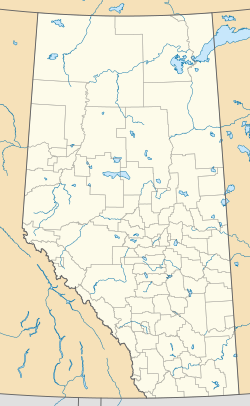Rosemary, Alberta
Rosemary | |
|---|---|
| Village of Rosemary | |
| Coordinates: 50°45′27″N 112°05′5″W / 50.75750°N 112.08472°W | |
| Country | Canada |
| Province | Alberta |
| Region | Southern Alberta |
| Census Division | 2 |
| Municipal district | County of Newell |
| Incorporated[1] | |
| • Village | December 31, 1951 |
| Government | |
| • Mayor | Don L. Gibb |
| • Governing body | Rosemary Village Council |
| Area (2021)[2] | |
| • Land | 0.59 km2 (0.23 sq mi) |
| Elevation | 745 m (2,444 ft) |
| Population (2021)[2] | |
• Total | 370 |
| • Density | 630.3/km2 (1,632/sq mi) |
| Time zone | UTC−7 (MST) |
| • Summer (DST) | UTC−6 (MDT) |
| Highways | 550 |
| Waterways | Rock Lake |
| Website | Official website |
Rosemary is a village in southern Alberta, Canada. It is approximately 30 km (19 mi) northwest of Brooks and 14 km (8.7 mi) north of the Trans-Canada Highway. It is home to one school and several businesses.
Demographics
In the 2021 Census of Population conducted by Statistics Canada, the Village of Rosemary had a population of 370 living in 139 of its 167 total private dwellings, a change of -6.6% from its 2016 population of 396. With a land area of 0.59 km2 (0.23 sq mi), it had a population density of 627.1/km2 (1,624.2/sq mi) in 2021.[2]
In the 2016 Census of Population conducted by Statistics Canada, the Village of Rosemary recorded a population of 396 living in 146 of its 150 total private dwellings, a 15.8% change from its 2011 population of 342. With a land area of 0.59 km2 (0.23 sq mi), it had a population density of 671.2/km2 (1,738.4/sq mi) in 2016.[3]
The Village of Rosemary's 2012 municipal census counted a population of 421.[4]
See also
References
- ^ "Location and History Profile: Village of Rosemary" (PDF). Alberta Municipal Affairs. October 21, 2016. p. 527. Retrieved October 23, 2016.
- ^ a b c "Population and dwelling counts: Canada, provinces and territories, and census subdivisions (municipalities)". Statistics Canada. February 9, 2022. Retrieved February 9, 2022.
- ^ "Population and dwelling counts, for Canada, provinces and territories, and census subdivisions (municipalities), 2016 and 2011 censuses – 100% data (Alberta)". Statistics Canada. February 8, 2017. Retrieved February 8, 2017.
- ^ "2012 Municipal Affairs Population List" (PDF). Alberta Municipal Affairs. 2012-11-22. Retrieved 2012-12-14.

